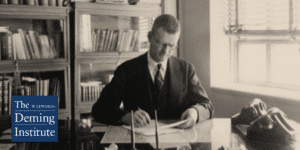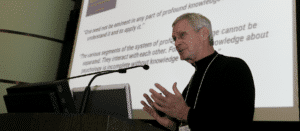Theory of Knowledge
By John Hunter, founder of CuriousCat.com. This webcast continues Ian Bradbury’s Deming 101 presentation looking at the Theory of Knowledge and the PDSA Learning Cycle. Commenting on Deming’s presentation of the PDSA (plan-do-study-act) cycle in 1951 Ian says It is articulated as a learning cycle. A learning cycle in which you are trying to build […]
Guest post by Mike Stoecklein [broken link removed] I was at Purdue University this past weekend for what I would call a “homecoming”. I did not attend this university, but I still think of this as a homecoming. The W. Edwards Deming Institute hosts an annual conference at universities around the United States. This year […]
By John Hunter, founder of CuriousCat.com. Improvement of Quality and Productivity, to be successful in any company, must be a learning process, year by year, top management leading the whole company. W. Edwards Deming page 139, Out of the Crisis Understanding the importance of learning is often one sign of the maturity of the improvement […]
By John Hunter, founder of CuriousCat.com. Prediction is the Problem, Ron Moen’s presentation at the 2012 Annual Deming Conference. “Planning requires prediction. Prediction requires a theory.” In the video Ron Moen talks about the Associates for Process Improvement model for improvement. The enhanced PDSA cycle includes an explicit focus on prediction in the planing phase […]
By John Hunter, author of the Curious Cat Management Improvement Blog. Fundamental attribution error: attribute fault or defect to the individual without first considering the systemic effect. When we fall into this trap the system is not improved. What we want to do is when we find poor results is think about how the system […]
By John Hunter, founder of CuriousCat.com. Dr. Deming’s included the the theory of knowledge (how do we know that what we “know” is so) as one of the four inter-related components of his management system. How to apply an understanding of the theory of knowledge within the management system for their organization often gives people […]
By John Hunter, founder of CuriousCat.com. One of the most talked about presentations at this years annual conference for The W. Edwards Deming Institute was JW Wilson’s: The Neuroscience of Deming. The talk included a great deal of detail on neuroscience which was quite interesting. While some content may have been a bit of a […]
By John Hunter, founder of CuriousCat.com. Gemba is a Japanese term for “the real place” or in management terms “where the important action takes place.” The most common use of the term “gemba,” in a management context, is with respect to defining where the important work is done within an organization. Deming organizations, and lean […]
By John Hunter, author of Management Matters: Building Enterprise Capability. The Essential Deming: Leadership Principles from the Father of Quality is filled with articles, papers, lectures, and notes touching on a wide range of topics, but which focus on Deming’s overriding message: quality and operations are all about systems, not individual performance; the system has […]
Guest post by John Hunter, author of the Curious Cat Management Improvement Blog (since 2004). Dr. Deming explained that paying sales commissions to staff introduced distortions into the organization that damaged overall performance. Each topic has different connections to Deming’s System of Profound Knowledge, as he laid it out in The New Economics. The problems […]
- « Previous
- 1
- 2
- 3
- 4
- Next »




